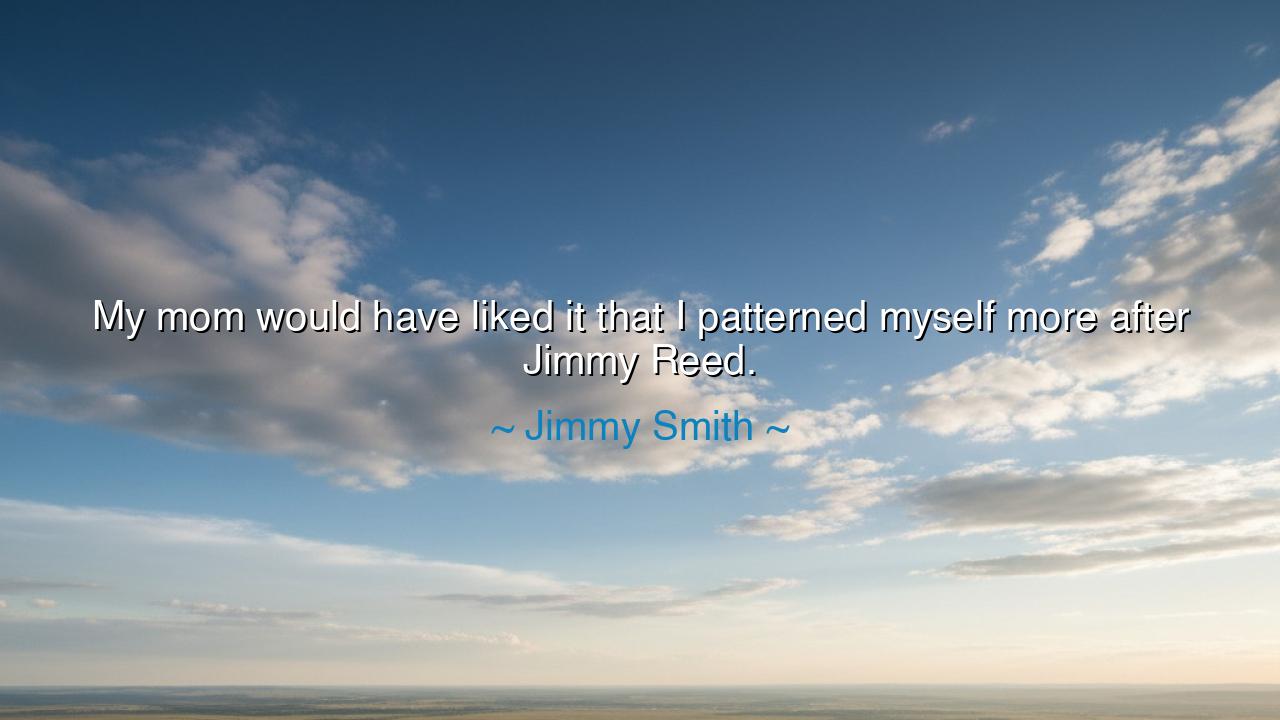
My mom would have liked it that I patterned myself more after






The words of Jimmy Smith, “My mom would have liked it that I patterned myself more after Jimmy Reed,” are rich with the weight of memory and the longing for approval. At first they appear simple, almost casual, but within them lies a profound truth about the bond between parent and child, the shaping power of music, and the eternal human desire to live in harmony with both one’s roots and one’s influences. For Smith, the great master of the Hammond organ, his mother’s voice lingered as a guiding star, even as he carved his own path in the world of jazz.
The origin of these words comes from Smith’s acknowledgment of Jimmy Reed, the bluesman whose style was raw, simple, and deeply rooted in the soul of ordinary people. Reed’s songs were unpretentious, built upon rhythm and feeling rather than complexity, and his sound carried into the hearts of men and women who lived with hardship but sought solace in music. Smith, by contrast, was a pioneer of jazz organ, celebrated for his innovation, virtuosity, and daring improvisation. His art soared into uncharted territory, dazzling audiences, but perhaps also straying from the plain, heartfelt simplicity his mother might have cherished.
This tension between innovation and tradition is as old as time. Consider the story of Plato and Socrates: Socrates taught with humble speech in the marketplace, speaking plainly to the people, while Plato transformed those teachings into soaring philosophies written in dialogues that reached through centuries. Socrates’ way was simple and close to the earth; Plato’s way was brilliant and far-reaching. Both had value, but many mourned that something of the warmth and humility of the teacher was lost in the brilliance of the student. So too, Jimmy Smith seems to confess that while his artistry blazed trails, his mother might have preferred the soulful simplicity of Jimmy Reed.
There is humility in his reflection. For a son to say, “My mother would have liked it better had I been more like another man,” is not bitterness but reverence. It is the recognition that mothers often long for their children to remain close to the traditions of the past, to embody the values they themselves held dear. To Smith’s mother, Jimmy Reed represented an honesty of sound, a music of the people, unadorned and true. Her son, though a genius, had gone further, and perhaps she longed for a touch more earth and a touch less fire.
Yet we must not see this as a failure. Rather, it is the eternal dance of parental hope and individual destiny. Every generation hopes to see its values continued in the next, yet every child must forge a path uniquely their own. Smith honored his mother’s vision even in this statement, for by naming Reed, he acknowledged her wisdom, even as he stood firm in his own brilliance. His mother’s desire was not denied—it was remembered, cherished, spoken aloud—woven into his legacy like a harmony beneath the melody of his own life.
The lesson here is profound: we must honor the wishes of those who raised us, even when our paths diverge. Their hopes shape us, but our destiny may lead elsewhere. To acknowledge their influence is not to surrender our individuality, but to anchor it in gratitude. Jimmy Smith teaches us that it is possible to blaze new trails while still remembering the voices that first sang to us, even if we did not follow them exactly.
Practically, this means we should never forget the influences that guided us in youth—the parents, mentors, teachers, and heroes who pointed us toward what they valued most. Even if we take a different path, we must speak their names with reverence, as Smith spoke of his mother and of Reed. And in our own lives, as guides for others, we must recognize that those we love may not follow the exact pattern we wish for them. Yet if they remain true to their calling, and remember us with gratitude, then our influence has not been lost—it has been transformed.
Thus, Jimmy Smith’s words are not a lament but a teaching. To honor one’s roots does not mean to be bound by them, and to follow one’s destiny does not mean to forget the voices of the past. His mother dreamed of Jimmy Reed’s blues; he became the prophet of the organ. Between them lies a truth for all generations: love remembers, even when paths diverge, and gratitude sanctifies every difference.






AAdministratorAdministrator
Welcome, honored guests. Please leave a comment, we will respond soon